
Question 1: Over the past 20 years, how have individual investors done? What kind of returns have they had?
Well, back up. We know that active managers tend to underperform the markets by about the amount of fees — mutual fund managers underperform by about the amount of fees. Over the past 20 years, individual investors have done even worse. So at a time when, according to Dalbar, the stock market has gone up annually 5.6, 5.8%, bonds have gone up annually 4.5%, individual investors — their money has gone up annually about 1.9%. So that doesn't even keep up with inflation, which is estimated to be 2.2%. Why is this? Because we sometimes are our worst enemies. I mean there are many reasons for it. But you over-trade, you tend to panic when times are tough, markets are bad, and you're trading in and out at the wrong time.
Question 2: My company doesn't report its gender pay gap, so it doesn't have one … right?
Uh, wrong. On average, if women are making 80 cents to a man's dollar — sometimes it's 78 cents, sometimes it's 82 cents — then on average, your company has a gender pay gap. And that can be even if it's great people who are there, because in a society in which men have been socialized to negotiate and women have been socialized not to, and bosses — who are just looking for the bottom line — if someone asks for the money they'll give it to them, and if they don't, they won't … you've got a gender pay gap. So if your company isn't reporting one, ask them to.
And go deeper on topics like cybersecurity and artificial intelligence at Microsoft on The Issues